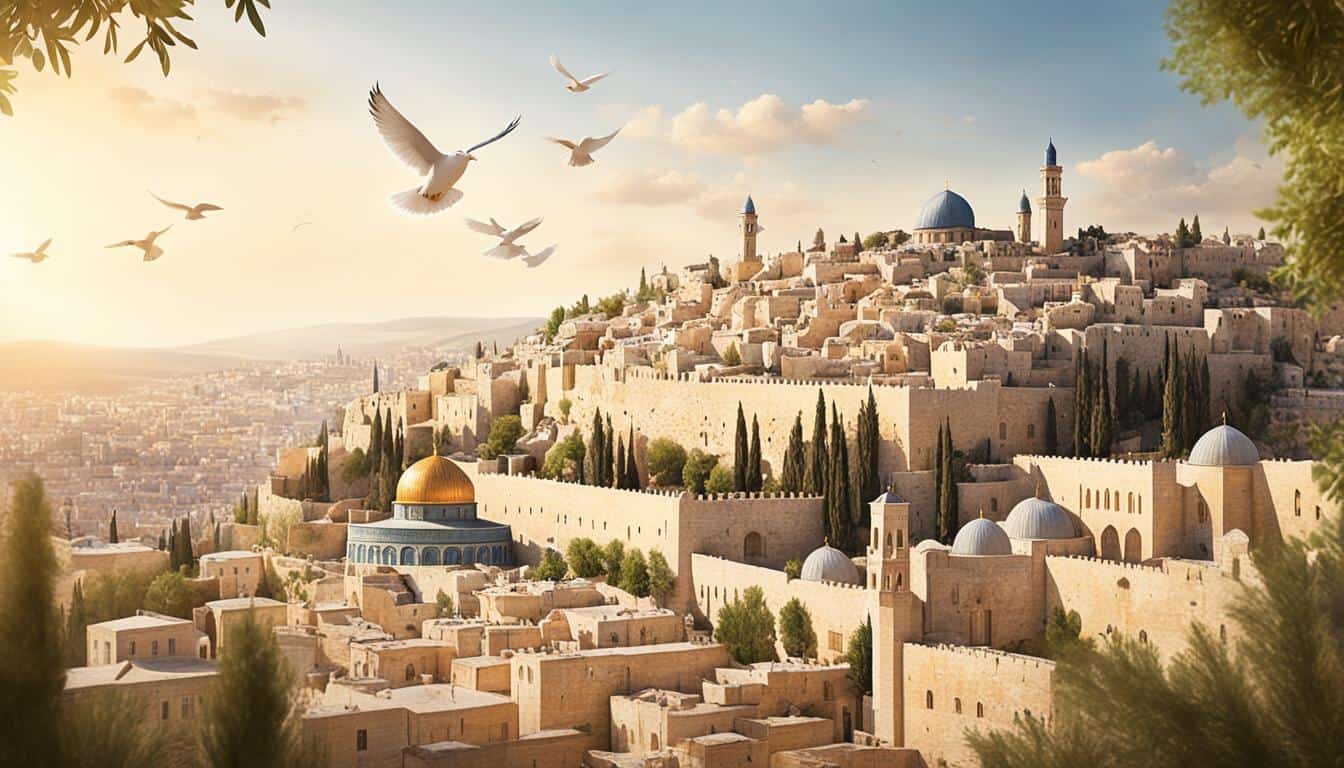Table of Contents
Have you ever thought about Jerusalem’s importance in seeking peace?
It’s often called a symbol of divine harmony. Let’s explore the deep spiritual meaning of Jerusalem as a peace beacon. We’ll look into biblical references, like those in Isaiah 2:3-4. You’ll see how Jerusalem represents Zion’s Peace in a unique way.
The Prophetic Promise of Peace in Jerusalem (Isaiah 2:3-4)
In Isaiah’s book, a prophecy hints at Jerusalem’s peaceful future. It says in Isaiah 2:3-4:
“And many people shall go and say, Come ye, and let us go up to the mountain of the Lord, to the house of the God of Jacob; and he will teach us of his ways, and we will walk in his paths: for out of Zion shall go forth the law, and the word of the LORD from Jerusalem. And he shall judge among the nations, and shall rebuke many people: and they shall beat their swords into plowshares, and their spears into pruninghooks: nation shall not lift up sword against nation, neither shall they learn war any more.”
This vision shows a time when folks from all countries gather in Jerusalem. They seek the Lord’s wisdom. It paints a picture of unity, with people living in peace, guided by God.
Isaiah’s prophecy deeply influences how we view peace. It suggests real peace starts in Jerusalem, God’s chosen city. From there, God’s teachings spread worldwide, ending wars and bringing nations together.
Jesus brings this prophetic peace to life. Through his life and teachings, Jesus embodies Isaiah’s vision. He makes Jerusalem the starting point for spreading peace everywhere.
Jesus teaches peace and acts on it. He advocates for love, forgiveness, and bringing people together. His sacrifice opens the way to the peace Isaiah talked about.
We, as believers, are urged to live out this prophecy. We should work for peace, just like Jesus did. Isaiah encouraged turning weapons into tools of growth. That’s our mission too.
Let’s keep Isaiah’s message and Jesus’ example in mind. Living as peacemakers, we bring Christ’s peace to a world craving unity and healing.
Isaiah 2:3-4
| Vision of Peace | Fulfillment in Jesus |
|---|---|
| People from all nations coming to Jerusalem | Jesus’ ministry bringing people together |
| Learning from the Lord in Zion | Jesus teaching and guiding people |
| Beat swords into plowshares | Jesus bringing reconciliation and peace |
| Nation shall not learn war anymore | Jesus calling for love and forgiveness |
Jerusalem: The City Where God Dwells (Psalm 132:13-14)
Jerusalem is the chosen city where God lives, as mentioned in Psalm 132:13-14:
“For the Lord hath chosen Zion; he hath desired it for his habitation. This is my rest forever: here will I dwell; for I have desired it.”
The psalmist tells us that God picked Jerusalem as His home. This choice shows God’s presence and makes Jerusalem a symbol of all that is holy.
God choosing Jerusalem highlights His wish for a permanent presence there. It shows the city’s importance as a special place for worship and connection to God.
For ages, people have gone to Jerusalem to feel closer to God. Its key role in faith highlights its status as God’s chosen city.
Jerusalem’s link with God matters greatly to believers today. It signifies God’s ultimate presence through Jesus Christ.
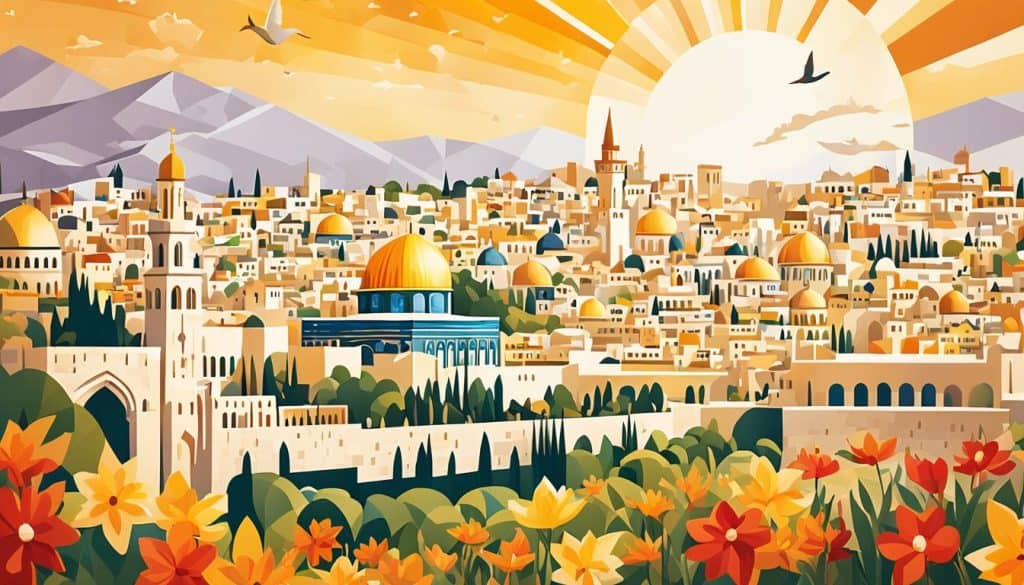
Jesus: The Embodiment of God’s Presence
Jesus, as God’s Son, fulfills God’s promise to live among us. In the New Testament, Jesus calls Himself the temple, showing He’s God’s true home:
“Destroy this temple, and in three days I will raise it up.” – John 2:19
Jesus hints at His death and resurrection bringing God’s presence to us. His actions create a new promise that lets us connect with God personally.
Thinking of Jerusalem as God’s dwelling leads us to Jesus. He shows God’s presence and helps us have a deeper bond with God.
| Jerusalem: The City Where God Dwells | Holy City | Symbol of Divine Presence |
|---|---|---|
| Significance of Jerusalem as the chosen city | Jerusalem as a sacred and holy place | God’s everlasting presence in Jerusalem |
| The role of Jerusalem in worship and spiritual connection | Jerusalem as a focal point of religious practices | Communing with God in the city |
| Jesus as the embodiment of God’s presence | The temple of God in human form | Access to God through Jesus |
The Triumphal Entry: Jesus as Jerusalem’s King of Peace (Luke 19:37-38)
As Jesus arrived in Jerusalem, people celebrated him as their King of Peace. This event, the Triumphal Entry, met Old Testament prophecies. It showed Jesus’ mission to deliver true peace.
According to Luke 19:37-38, the crowd covered the road with their cloaks for Jesus. They cheered for him happily. They saw Jesus as the promised Messiah. They believed he was the king who would bring peace.
“Blessed is the King who comes in the name of the Lord! Peace in heaven and glory in the highest!”
This shout ties back to prophecies in the Old Testament. Zechariah 9:9 said, “Rejoice greatly, daughter of Zion! Shout, daughter of Jerusalem! Behold, your King comes to you! He is righteous and having salvation, lowly, and riding on a donkey, even on a colt, the foal of a donkey.”
The Triumphal Entry matched this prophecy. It showed Jesus as the peaceful King who chose a modest donkey over grandeur. This act spotlighted Jesus as a servant-king, aiming to unite and bring peace to believers.
Also, Jesus entering Jerusalem was a step towards peace through his death on the cross. His entrance as the Prince of Peace hinted at the deep peace he would achieve. This would heal the divide between God and humanity through his sacrifice.
Reflecting on this moment invites us to see Jesus as our King of Peace. Like the joyous crowd in Jerusalem, we can welcome him into our hearts. In doing so, he guides us and fills us with his peace.
| Key Points | Scripture Reference |
|---|---|
| The Triumphal Entry marks Jesus’ arrival as the King of Peace in Jerusalem | Luke 19:37-38 |
| The event fulfills Old Testament prophecies about Jerusalem’s awaited king | Zechariah 9:9 |
| Jesus’ humble entry on a donkey emphasizes his role as a servant-king | Luke 19:35-36 |
| The Triumphal Entry foreshadows Jesus’ sacrificial death and the ultimate peace he brings | Luke 19:41-42 |
Jesus Weeping Over Jerusalem (Luke 19:41-42)
As Jesus looked at Jerusalem, sadness filled his heart. Tears came to his eyes as he saw the city he loved so much. He felt a deep compassion for its people.
Why was Jesus crying for Jerusalem? His sorrow came from understanding the city’s future. He felt for the city and knew what was coming.
“And when he was come near, he beheld the city, and wept over it, saying, ‘If thou hadst known, even thou, at least in this thy day, the things which belong unto thy peace! but now they are hid from thine eyes.'” – Luke 19:41-42
Jesus cry showed his sadness for Jerusalem’s fate. He saw the destruction that was ahead. The people didn’t accept him, which would bring them hardship.
This sad moment shows how much Jesus cared about Jerusalem. He wanted to bring them back together and save them. He wished to give them a peace that was beyond all understanding.
Just like he did for Jerusalem, Jesus also cares about our struggles. He sees our pain and brokenness. His heart goes out to us, giving comfort and hope.
Jesus’ tears remind us of his great love and mercy. Despite our mistakes, he is always there for us. His tears are a sign of his willingness to share in our pain and help us through hard times.
Remember Jesus’ tears as a sign of his undying love for us. Through his tears, we’re reminded that he can heal and bring peace into our lives.
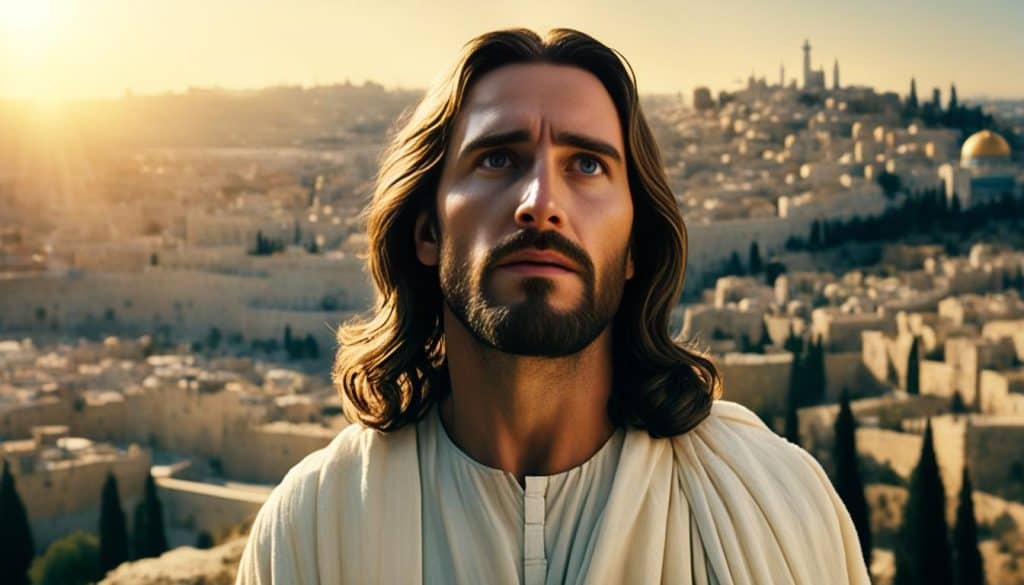
The New Jerusalem: A Vision of Eternal Peace (Revelation 21:2-4)
Revelation 21:2-4 shows us the New Jerusalem. It symbolizes God’s promise of peace perfected. Here, eternal harmony rules and every tear is wiped away.
The New Jerusalem descends, ready like a bride for her partner. It shows the coming together of heaven and earth. Its beauty mesmerizes everyone, revealing a peace beyond our grasp.
God’s presence is key in the New Jerusalem. He lives with His people there. His glory fills the city with love, offering peace that’s deep and beyond words.
“And I heard a great voice out of heaven saying, Behold, the tabernacle of God is with men, and he will dwell with them, and they shall be his people, and God himself shall be with them, and be their God. And God shall wipe away all tears from their eyes; and there shall be no more death, neither sorrow, nor crying, neither shall there be any more pain: for the former things are passed away.” (Revelation 21:3-4)
Peace rules in the New Jerusalem. Past pains are gone, thanks to God’s renewal. This vision promises us peace amid our current struggles.
Jesus makes this eternal peace possible. His sacrifice and triumph remove sin and death. He is our peace and promises us everlasting life in this peaceful city.
While we live our lives, we can take comfort in this beautiful vision. We look forward to God’s complete peace. And we try to live out this peace every day.
| Key Elements of the New Jerusalem | Description |
|---|---|
| Presence of God | God dwells among His people, bringing His glorious presence and unconditional love. |
| Union of Heaven and Earth | The New Jerusalem symbolizes the ultimate reconciliation between God’s heavenly kingdom and the physical world. |
| Wiping Away of Tears | All sorrow, pain, and suffering are eradicated, replaced by everlasting joy and peace. |
| Renewal and Restoration | The former things, including death and pain, are forever passed away, making room for newness and abundant life. |
| Jesus as the Source of Peace | Jesus’ sacrifice and victory over sin and death pave the way for the realization of eternal peace in the New Jerusalem. |

Jerusalem at Pentecost: The Birthplace of the Church (Acts 2:1-4)
Jerusalem is vital in Christianity’s history as where the Church started. During Pentecost, a key event changed the early Christian movement’s direction. Acts 2:1-4 tells us about the Holy Spirit coming to the disciples. This moment marked the Church’s beginning and gave power to the believers.
On Pentecost day, Jesus’ followers were together in Jerusalem. Suddenly, a strong wind filled their place, and they saw fire above each one’s head.
They were filled with the Holy Spirit and started speaking in various languages. This amazing event showed the Holy Spirit’s power and started the Church’s mission to spread Jesus’ message.
Jerusalem, being the spiritual center, was the perfect place for the Church to start. This city brought devout Jews from many places together. The disciples could spread the gospel in many languages, reaching different people. This moment showed unity and inclusivity, as diverse groups heard Jesus’ life-changing message.
“And there appeared unto them cloven tongues like as of fire, and it sat upon each of them. And they were all filled with the Holy Ghost and began to speak with other tongues, as the Spirit gave them utterance.” – Acts 2:3-4 (KJV)
The Holy Spirit’s arrival at Pentecost filled Jesus’ disciples and followers with passion. They began to bravely share the gospel and form the early Christian community. Their efforts helped the Church grow and reach beyond Jerusalem to the entire Roman Empire and further.
This event highlights Jerusalem’s crucial role in founding the early Church. It was in this historic and divinely chosen city that the Church was born.
This event changed many lives and had a worldwide impact on Christianity. Jerusalem’s importance as the Church’s birthplace is everlasting and inspires believers today.
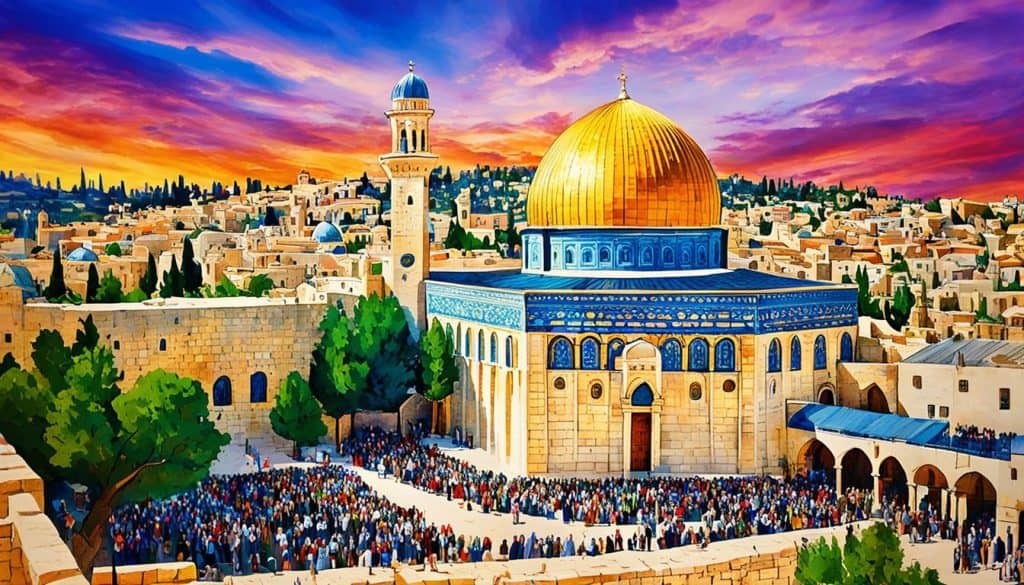
| Key Points to Note | Implications |
|---|---|
| Pentecost marked the birth of the Church in Jerusalem. | The Church holds a special place in Jerusalem’s history and spiritual significance. |
| The outpouring of the Holy Spirit empowered believers to spread the message of Jesus. | Jerusalem became the starting point for the global mission of the Church. |
| The diverse audience in Jerusalem enabled the gospel to reach people from various nations. | The inclusivity displayed at Pentecost emphasizes the universal nature of Christianity. |
Jesus Praying for Jerusalem’s Peace (Matthew 23:37)
In Matthew 23:37, Jesus shows his deep love for Jerusalem. He prays for the city’s peace with great passion. His heart overflows with compassion for its people, wishing them to know peace that comes from him.
This moment highlights Jesus’ main goal. He aimed to fix the bond between God and humans and heal the world’s wounds. Jerusalem, being the holy city, was key to God’s plan of salvation. Jesus’ prayer was a pledge to bring eternal peace to it.
“O Jerusalem, Jerusalem, thou that killest the prophets, and stonest them which are sent unto thee, how often would I have gathered thy children together, even as a hen gathereth her chickens under her wings, and ye would not!” (Matthew 23:37)
His prayer reflects a deep, sad love. Jesus wants to protect Jerusalem’s people like a mother hen does with her chicks. But he knows they’re resistant to his message of peace.
We, as Christ’s followers, can learn much from his prayer for Jerusalem. He shows us to pray for our cities and nations. Like Jesus, we should wish for peace and healing in our communities.
Jesus’ prayer teaches us to seek peace in our lives. It shows the strong effect prayer can have. By following Jesus, we can spread peace and help God’s kingdom grow on earth.
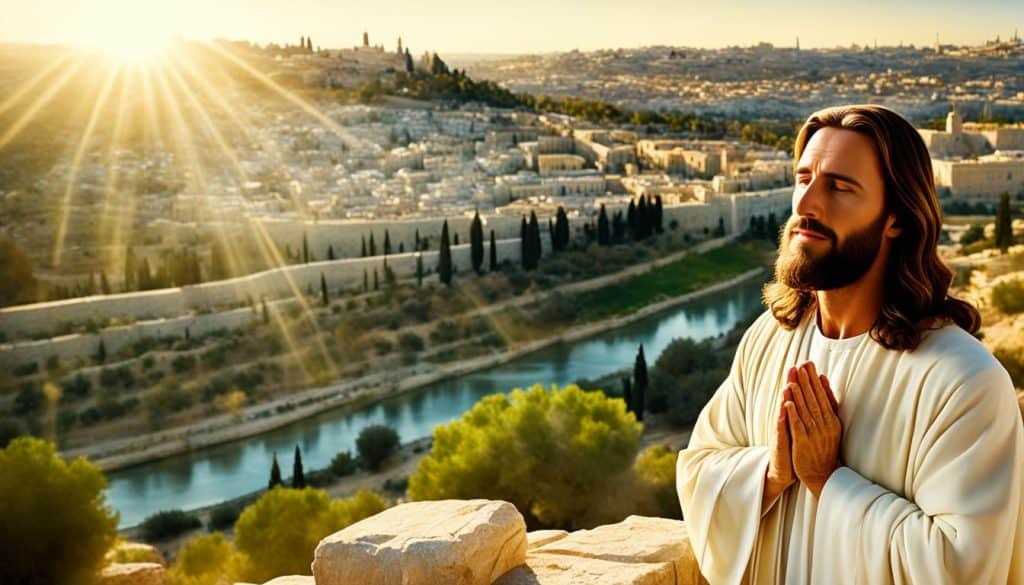
Key Takeaways:
- Jesus’ prayer for Jerusalem’s peace showcases his deep love and desire for reconciliation.
- We are called to emulate Jesus’ prayerful attitude and intercede for the peace of our communities.
- By aligning our hearts with Jesus’ mission, we can become catalysts for peace in our relationships and communities.
Jerusalem in the Psalms: A City United in Worship (Psalm 122:6-7)
The Psalms are filled with songs of worship and love for God. They show us how God and His people connect. The psalms look at Jerusalem as a city full of peace and united by worship. Psalm 122:6-7 urges us to pray for Jerusalem’s welfare, recognizing its role in God’s plan.
Jerusalem is very important in the Psalms. It’s seen as God’s home and a place where people worship. This city brings together folks from all walks of life to celebrate and honor God.
Worship in Jerusalem brings believers together. It doesn’t matter if we are there in person or in spirit. Meeting to worship reminds us that we share our faith and have a common goal in serving God.
The Psalms include many different ways to worship: praise, thanks, cries of sadness, and requests for help. They show us the value of gathering to honor God’s kindness, ask for His advice, and share what’s in our hearts with Him.
“Pray for the peace of Jerusalem: they shall prosper that love thee. Peace be within thy walls, and prosperity within thy palaces.” (Psalm 122:6-7)
These lines from Psalm 122 invite us to pray for Jerusalem and its people. When we pray for Jerusalem’s peace and success, we are following God’s wishes. This helps the city and its people flourish.
We, as believers, are asked to worship together and see Jerusalem as a special city for God. This reminds us that gathering in worship brings real peace and unity. We put our differences aside and find common ground as God’s children.
The Psalms talk about the peace that Jesus gives to all who believe. It’s through Him we make up with God and each other. Worshipping together, we should seek unity, looking forward to when nations will unite in worship in heaven.
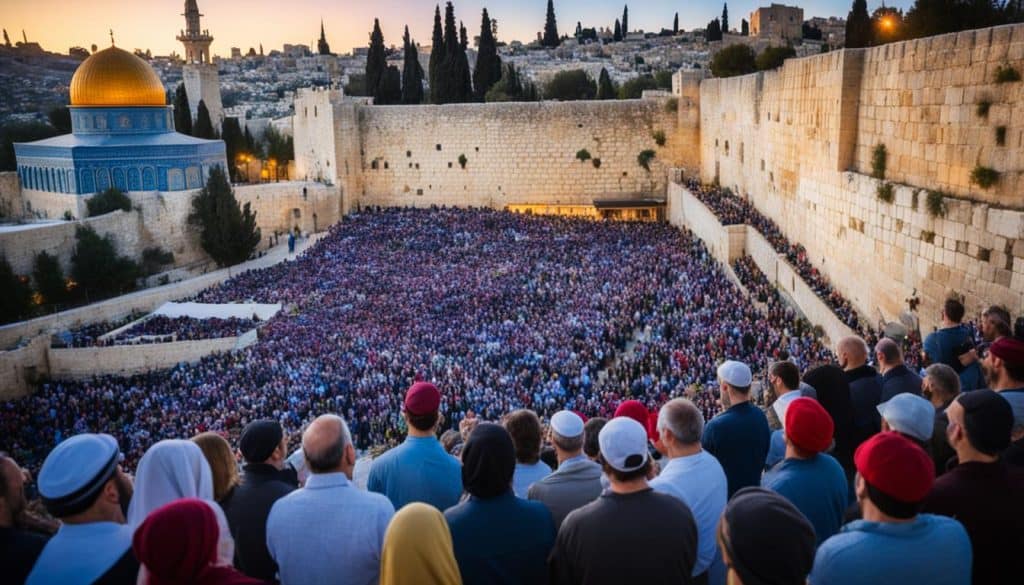
Key Takeaways
- Jerusalem is portrayed in the Psalms as a city embodying peace and unity through worship.
- Through worship, we can bridge divides and experience unity as believers.
- Praying for the peace and prosperity of Jerusalem aligns us with God’s will.
- True peace and unity are found in Jesus, who offers reconciliation with God and one another.
- The Psalms remind us of the power and significance of worship in fostering unity among believers.
Jesus’ Predictions and Jerusalem’s Future (Luke 21:20-24)
In Luke 21:20-24, Jesus warns us about tough times ahead for Jerusalem. His message makes us rethink what peace really means. Even in the face of destruction, there’s hope in his words.
He talks about armies surrounding Jerusalem, signaling trouble. Jesus tells his followers to escape for safety. These warnings highlight the difficulties we might face while seeking peace.
Jesus’ message has a deeper meaning about peace. True peace involves overcoming tough situations. The future of Jerusalem reminds us that peace comes with hope and effort, not just the absence of conflict.
“There will be great distress upon the earth and wrath against this people. They will fall by the sword and be taken as prisoners to all nations. Jerusalem will be trampled on by the Gentiles until the times of the Gentiles are fulfilled.” – Luke 21:23-24
Jesus teaches us how to find peace in hard times. He encourages loving enemies, seeking justice, and pushing for unity. Peace is about working towards harmony, not just avoiding fights.
Jesus’ warnings push us to think differently about peace. They urge us to face challenges with courage, aiming for peace and trusting in God’s plan for a better world.
| Predictions | Meaning |
|---|---|
| Jerusalem surrounded by armies | Imminent danger and potential destruction |
| Desolation of Jerusalem | A time of intense distress and devastation |
| Fleeing from Jerusalem | Preservation of lives in the face of impending danger |
| Times of the Gentiles | A period of gentile dominance and Jerusalem’s temporary state of subjugation |
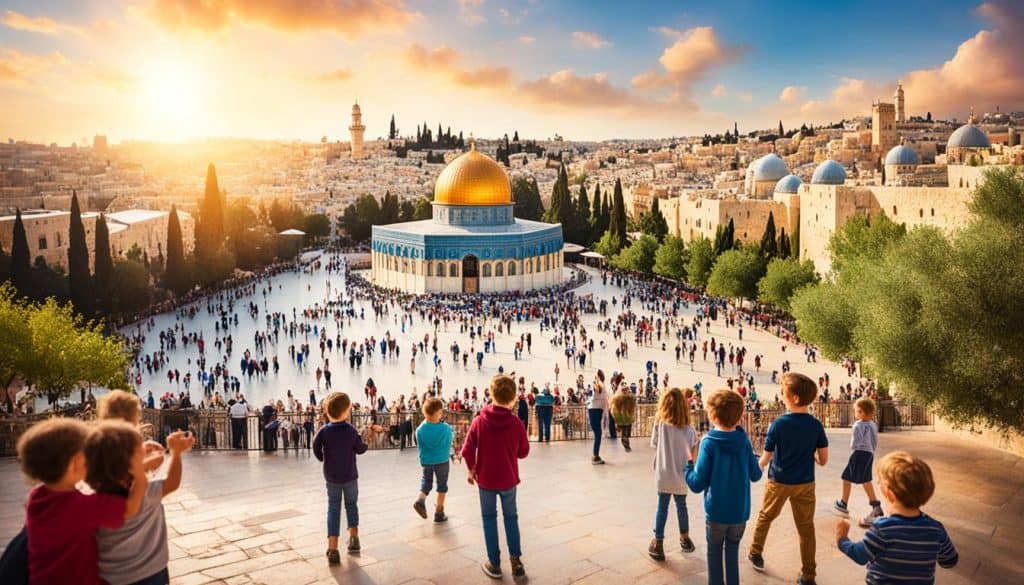
Jesus’ words invite us to find peace in tough challenges. He leads us on a journey of transformation, where peace is both our goal and our path, fueled by bravery, faith, and a desire for unity.
The Heavenly Jerusalem: Our Final Home (Hebrews 12:22-24)
As we end our study of Jerusalem’s role in peace, the heavenly Jerusalem stands out. It’s highlighted in Hebrews 12:22-24 as our ultimate home. This city is important for our hearts and thoughts.
The heavenly Jerusalem is seen as a place of total peace and unity. It represents our hope to be right with God and to see His promise of never-ending peace come true. In this divine city, every argument and war end, bringing us together with God.
Jesus is key to experiencing the heavenly Jerusalem. He fixes the relationship between people and God, allowing us into our final home. His sacrifice and comeback give us access to the heavenly Jerusalem and its promise of lasting peace.
The thought of the heavenly Jerusalem guides us in life. It offers us real hope during hard times. Our destined final home promises us complete peace, eternal friendship with God, and joy that never stops.

